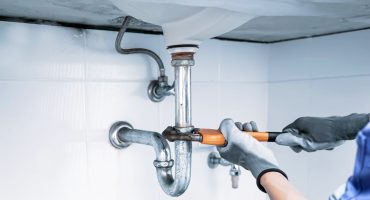The article author is making several great points related to Plumbing Problems In Old Homes in general in the article in the next paragraphs.

Older homes usually include beauty, character, and background, but they can likewise bring a host of plumbing concerns. Whether you're dealing with maturing pipelines, low tide stress, or leaks, understanding just how to resolve these common issues is vital to keeping a safe and practical home. In this guide, we'll explore the typical pipes challenges encountered by older homes and offer practical remedies to keep your pipes in top form.
Comprehending Usual Plumbing Concerns
Aging Pipelines
Among one of the most common problems in older homes is aging pipes. Relying on the era in which your home was developed, the pipelines might be made from products that have deteriorated with time, such as galvanized steel, cast iron, or even lead. These products can wear away, become breakable, or develop leakages, leading to water damage and prospective carcinogen.
Water Top Quality Testing
Older pipes can impact the top quality of your water. Conduct a water quality test to check for impurities such as lead, corrosion, or various other impurities that may be presented by maturing pipelines.
Solutions for Usual Plumbing Issues
Replacing Aging Pipes
If your home has old, degrading pipelines, consider replacing them with modern materials like copper or PEX. This can be a considerable investment, yet it will avoid future problems and enhance the security and dependability of your pipes system.
Taking Care Of Low Tide Stress
To fix low water stress, beginning by cleansing or changing old components and removing mineral buildup in the pipes. If the trouble lingers, it might be essential to change areas of rusty pipelines.
Fixing and Changing Leaking Pipes
For small leaks, you can use pipe clamps or epoxy putty as a short-term fix. However, it's ideal to change dripping pipes completely to stay clear of more damage.
Updating Components
Updating old fixtures to contemporary, water-efficient designs can enhance your home's plumbing performance and reduce water consumption. Look for fixtures with the WaterSense label for the best performance.
Managing Pipeline Rust
If your pipes are corroded, replacing them with corrosion-resistant materials like copper, PVC, or PEX is the best remedy. Normal assessments and water high quality maintenance can help prevent better rust.
Low Water Stress
If you're experiencing low tide pressure, maybe as a result of natural resources, rust inside the pipes, or old components that are no longer operating effectively. This can be a major hassle, specifically in locations like showers and sinks.
Leaking Pipelines
Leaks are an additional regular issue in older homes, often brought on by corroded or damaged pipes. Also little leakages can cause significant water damages, mold development, and enhanced water costs if not resolved without delay.
Out-of-date Components
Out-of-date pipes fixtures such as taps, toilets, and showerheads not just look old but might also be much less efficient, susceptible to leakages, or incompatible with modern-day plumbing criteria.
Pipe Rust
Corrosion is a typical trouble in older pipes, especially those made from galvanized steel or cast iron. Rusty pipelines can restrict water circulation, create discoloration, and ultimately result in leakages or pipeline bursts.
Examining the Problem of Your Plumbing
Checking Noticeable Pipes
Begin by inspecting any type of noticeable pipelines in your home, such as those in basements, crawl spaces, or under sinks. Try to find signs of rust, leakages, or corrosion, which can indicate underlying problems.
Looking for Leakages
Look for leaks by checking locations around faucets, bathrooms, and under sinks. You can additionally check your water meter before and after a period of no water use to discover surprise leakages.
When to Call a Professional
While some plumbing problems can be taken care of with DIY options, there are times when it's ideal to call in an expert. If you're taking care of significant leakages, extensive deterioration, or are unclear about the condition of your pipes, an accredited plumbing professional can provide professional analysis and fixing.
Preventive Maintenance Tips
Regular Evaluations
On a regular basis evaluate your pipes system for signs of wear and tear. Catching issues early can prevent costly repair work down the line.
Water Stress Guideline
Guarantee your water stress is within the advised array to stay clear of emphasizing your pipelines and fixtures. A plumbing technician can mount a stress regulatory authority if needed.
Water Quality Maintenance
Mount water filters or conditioners if your water high quality is poor. This can secure your pipelines and components from damage caused by hard water or impurities.
Aggressive Pipeline Substitute
If your home has very old pipes, consider aggressive substitute before major issues arise. This can conserve you from emergency situation repair work and water damage.
Verdict
Taking care of plumbing problems in older homes requires a mix of caution, preventive upkeep, and prompt upgrades. By comprehending the common challenges and recognizing when to seek professional aid, you can ensure your pipes system stays functional and dependable for years ahead.
Common Plumbing Issues in Older Homes and How to Fix Them
Owning an older home in Australia comes with its unique charm and a set of challenges, especially when it comes to plumbing. The Sunshine Coast has many older properties that can harbour plumbing problems that aren t just inconvenient but potentially costly. Here s a look at some common plumbing issues in older homes and expert advice on how to handle them.
Outdated Piping Materials
Many older homes were built with galvanised steel, cast iron, or even lead pipes, materials that are far from ideal by today s standards. Galvanised pipes are prone to corrosion and clogging, while lead pipes pose serious health risks.
How to Fix:
Replacing old pipes is a job for a professional. Upgrading to copper or PVC piping not only enhances water quality and flow but also increases the property s safety and value. If you suspect your home has outdated materials, a licensed plumber can conduct a thorough inspection and recommend the best course of action.
Corrosion and Pipe Degradation
Over time, exposure to water and minerals can cause pipes to corrode, leading to leaks, bursts, and water contamination. Corrosion is especially common in homes over 50 years old.
How to Fix:
Regular inspections can catch early signs of corrosion. If corrosion is found, the affected section of piping often needs to be replaced. For homes with extensive corrosion, a complete plumbing overhaul might be necessary. It s crucial to consult with a plumbing expert to understand the extent of the issue.
Tree Root Intrusion
Older neighbourhoods usually have mature trees whose roots can intrude into pipe lines, causing blockages or damage. This is particularly problematic for sewer lines, where roots seek out water sources.
How to Fix:
A plumber can use a specialised camera to inspect sewer lines for root intrusion. If roots are a problem, methods like root cutting or hydro-jetting can clear the obstruction. In severe cases, part of the pipe may need replacing. Consider root barriers around the piping to prevent future issues.
Inadequate Water Pressure
Low water pressure in older homes can be due to various factors, including corroded water lines, sediment build-up in pipes, or outdated fixtures.
How to Fix:
First, check if the low pressure is isolated to one area or throughout the house. Replacing old fixtures can sometimes resolve the issue. However, if the problem is more widespread, it might be due to sediment or corrosion. Flushing the system or replacing the affected pipes usually restores normal pressure. Again, a professional assessment is advisable.
Outdated Fixtures
Older homes often feature fixtures that are not only visually dated but functionally inefficient. This includes everything from toilets and taps to showerheads and washing machine hoses.
How to Fix:
Updating these fixtures can improve both water efficiency and the aesthetic appeal of your home. Modern fixtures are designed to conserve water, which can significantly reduce your water bill and lessen your environmental impact.
Conclusion
Maintaining the plumbing in an older home requires a proactive approach. Regular checks and updates are key to preserving these beautiful properties. If you re facing plumbing issues in your older home, it s best to call on experienced professionals like Green & Gold Plumbing & Gas. With the right expertise, even the most daunting plumbing problems can be resolved, ensuring that your home s character is maintained while its functionality is enhanced.
https://gandgplumbing.com.au/common-plumbing-issues-in-older-homes-and-how-to-fix-them/

I am very excited about Main Plumbing Issues Found in Old Houses and I really hope you enjoyed reading the new post. Are you aware of another individual who is in the market for the niche? Be sure share it. Thank you for being here. Kindly pay a visit to our blog back soon.
Call Today